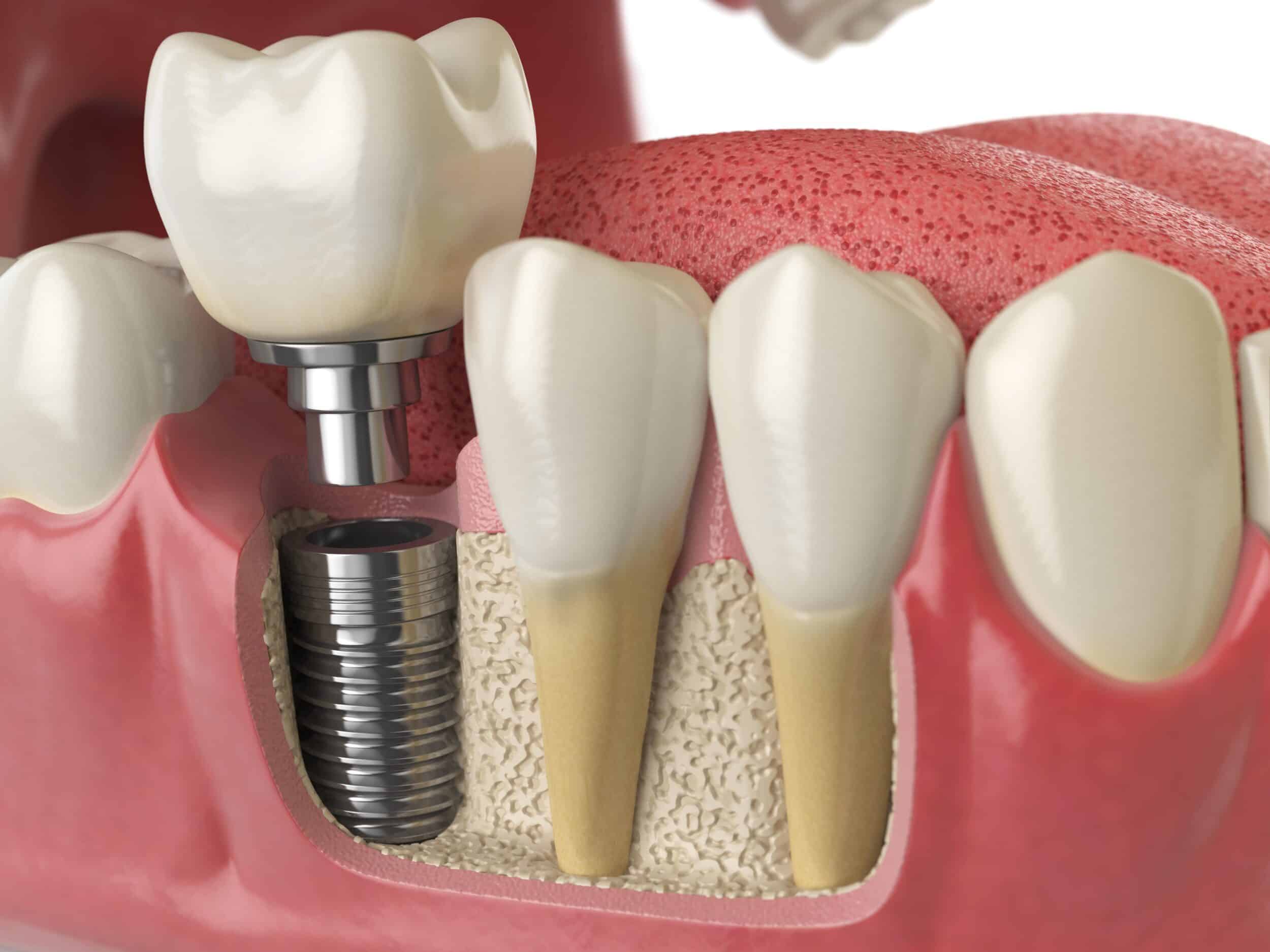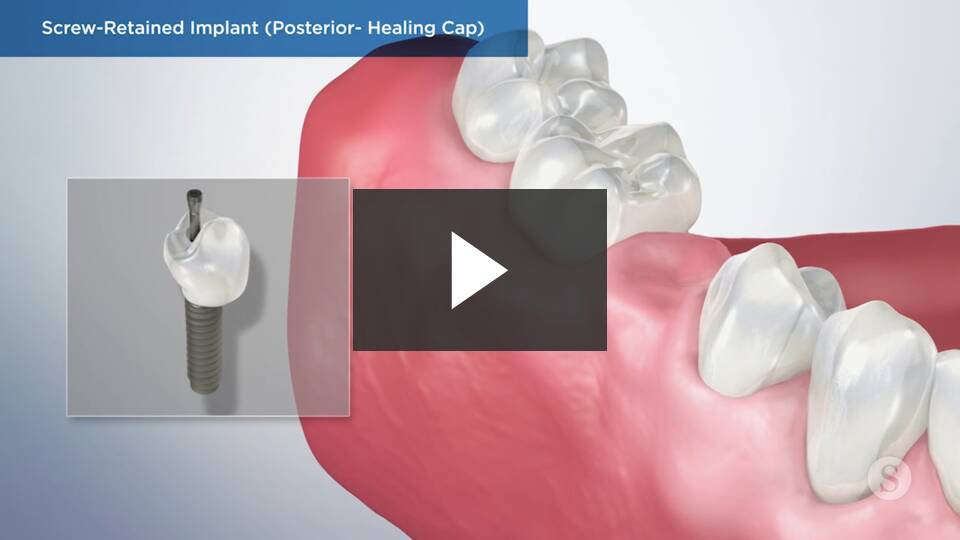If you have lost a tooth or are facing the loss of a tooth, you may feel like you want to start over with a brand new tooth. That’s what dental implants are for: they look and function like natural teeth, and if you care for them properly (brush, floss, and see the dentist), they can last you the rest of your life.

Dental implants are a great solution for replacing a tooth you have already lost or one you are likely to lose. Please call 760.832.7915 today for an appointment with Rancho Mirage implant dentist Dr. Rod Strober at Country Club Dentistry in Rancho Mirage. Dr. Strober is a Fellow of the International Dental Implant Association (FIDIA) and is ready to help restore your smile!
Benefits of Dental Implants
There is no doubt that dental implants are the best tooth replacement option available. That’s because they:
- Look like natural teeth: The dental crown (or bridge or denture) on top of the implant can perfectly match your natural teeth, and the gums nestle around it, just like a natural tooth.
- Function like natural teeth: You can bite and chew normally and enjoy all your favorite foods. If you’ve given up food because of unhealthy teeth or bad dentures, implants will let you enjoy them again.
- Support themselves: Dental implants are anchored in your jawbone, which means they don’t rely on your teeth for support (so they don’t damage your natural teeth).
- Stimulate your jawbone: Because implants go in your jawbone, they stimulate the bone so your body maintains the bone and it doesn’t shrink.
- Require no special care: Dental implants require the same care as natural teeth: brush, floss, and make regular dental visits.
- Can last a lifetime: Be sure to take good care of them!
What Is a Dental Implant and How Does It Work?

Think of a dental implant as your new, natural-looking tooth. It consists of three main parts: the implant, abutment, and dental crown. Here’s how it all comes together:
- The Implant: This is a small titanium post that gets placed into your jawbone. Over time, it bonds with the bone through a process called osseointegration, creating a strong, stable foundation for your new tooth.
- The Abutment: Once the implant is securely in place, an abutment is attached. This connector piece holds the crown securely to the implant.
- The Crown: This is the visible part of your new tooth. Made from high-quality, durable materials, the crown is custom-designed to match your natural teeth in color, shape, and size, so it blends seamlessly with your smile.
The Dental Implant Procedure
Getting a dental implant at Country Club Dentistry in Rancho Mirage is a straightforward process. Here’s what you can expect:
- Consultation and Planning: Dr. Rod Strober evaluates your oral health and uses X-rays or 3D imaging to plan the precise placement of the implant.
- Implant Placement: Under local anesthesia, he places the titanium post into your jawbone. Over a few months, it bonds with your bone, creating a stable foundation.
- Abutment Placement: After the implant integrates, he attaches an abutment to the implant. This minor procedure involves reopening the gum to secure the abutment.
- Healing Period: Your gums need a few weeks to heal around the abutment before placing the crown.
- Crown Placement: Once your gums heal, Dr. Strober places a custom-made crown. He ensures it fits perfectly and matches your natural teeth.
- Follow-Up and Care: You'll have follow-up visits to ensure everything heals well. Dr. Strober provides care instructions on how to maintain your implant.
Are You a Candidate for Dental Implants?
Most people can get dental implants if they want. You only need to meet three criteria. You must be:
- Missing one or more
- An adult whose jaw has stopped growing
- Healthy enough for surgery
If you meet those three criteria, you are a candidate for dental implants. Some other factors might make you a better candidate. The best candidates:
- Have good oral health
- Have adequate bone at the implant site
- Never smoked
- Are committed to caring for implants
Whether you are a good candidate depends on the health of your mouth. Dental implants don’t get cavities, but gum disease can cause them to fail. If you have gum disease, we will want to treat that before moving on to the next step.
You also need enough bone at the implant site (enough volume and enough density) to support your implants. If you don’t, you might need a bone graft before getting implants. We use the S.M.A.R.T (Subperiosteal Minimally invasive Aesthetic Ridge augmentation Technique) Bone Grafting method. This technique is key for patients who need to rebuild bone density in their jaws to support dental implants.
Smoking increases your odds of implant failure. The best candidates never smoked or stopped smoking at least 10 years ago. Smokers can still get them, but they will need to quit for several months while the implant heals.
As we said, gum disease can lead to implant failure, just as it leads to tooth loss. Unfortunately, as much as 70% of adults over age 65 have gum disease, so it’s important to be committed to caring for your oral health and your implants if you want them to last.
Why Choose Dr. Strober for Dental Implants?
Dr. Strober is extensively trained in cosmetic and general dentistry. He recently earned the rank of Fellow of the International Dental Implant Association (FIDIA). This honor required completing over 350 hours of dental implant coursework and placing numerous dental implants as part of an intense clinical workshop. He has the education and the skills to place them safely and accurately.
Frequently Asked Questions
Can Dental Implants Really Last a Lifetime?
Yes! Clinical studies show a survival rate of over 90% for up to 30 years, and some individuals have had them for up to 50 years – basically since they were invented.
What Are the Risks of Getting Dental Implants?
While dental implants are generally safe, there are some potential risks, including:
- Infection
- Nerve damage
- Sinus problems
- Implant failure
- Gum recession
Dr. Stober will discuss all possible risks with you to help you feel completely comfortable with your decision.
How Many Teeth Can Implants Replace?
They can replace any number of teeth, from one to your entire arch of teeth. We offer the All-on-x implant system, which replaces an entire arch of teeth with just four implants.
What Is Recovery Like After Getting a Dental Implant?
Recovering from a dental implant procedure is generally straightforward and involves a few key steps to ensure proper healing:
- Immediate Post-Procedure: Right after the procedure, you might experience some swelling, minor bleeding, and discomfort. Dr. Strober will provide pain relievers and detailed aftercare instructions to manage these symptoms.
- First Few Days: During the first few days, stick to a soft food diet to avoid putting pressure on the implant site. Good oral hygiene is crucial, so gently brush your teeth and use any prescribed antimicrobial mouthwash to keep the area clean.
- First Week: As the days go by, the swelling and discomfort should gradually subside. Continue following Dr. Strober’s care instructions, including avoiding strenuous activities that could affect the healing process.
- Healing Period: Over the next few months, the implant will bond with your jawbone in a process called osseointegration. This is vital for the stability and success of the implant. Regular check-ups with Dr. Strober will ensure everything is healing properly.
- Final Steps: Once the implant has fully integrated and your gums have healed, Dr. Strober will place the abutment and the custom-made crown. This marks the final step in the process, restoring your smile and function.
Learn More About Dental Implants in Rancho Mirage
Are you looking to replace one or more teeth in the Coachella Valley? Dental implants are likely your best replacement option. Please call 760-832-7915 to make an appointment with implant dentist Dr. Rod Strober at Country Club Dentistry in Rancho Mirage.



